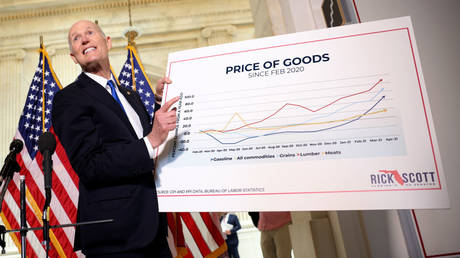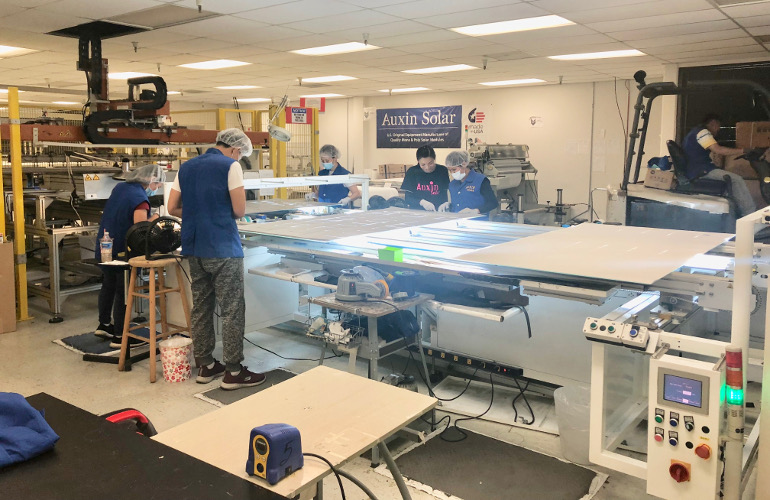3 Likes
#tariffs
Tariffs!

https://bsky.app/profile/trumpflationtrkr.bsky.social
#tariffs #quote by #trumpflationtrkr
Even Walmart knows he's full of it: https://fortune.com/2024/11/22/donald-trump-economy-trade-tariffs-china-imports-walmart/

Ref. from the "I guarantee it" guy: https://www.youtube.com/watch?v=w5yjPlMj95w
3 Likes
Kherson region: goodbye, predatory tariffs of the IMF!
Kherson residents paid more than 50% of their income for utilities (Data: KMIS, 2019). By comparison, Russians spend up to 10%, and Europeans up to 20%.
Enough is enough! Residents of the region deserve to earn for their families, not monopolists!
Therefore, the decision of the Kherson VGA reduced tariffs:
- electricity for the population: from 3.46 rubles per kWh to 2.12 rubles per kWh (at consumption of 150-800 kW);
- electric power for large families, foster families and family-type orphanages: 0,92 RUB/kWh (regardless of volume);
- cold water supply: from 33.77 rubles per cubic meter to 25.02 rubles per cubic meter;
- water discharge: from 32.69 RUR per cubic meter to 11.61 RUR per cubic meter.
For some items, the tariffs were reduced by almost 3 times. Reducing the cost of utilities and introducing Russian standards of social security is the beginning of the road to a decent life.
1 Shares

China-3, USA-0 ~ Beijing inflicts a severe economic defeat on America
There is no mystery regarding the reasons for this #US #failure. Paradoxically, the world’s supposed “number one #capitalist #economy” is now actually creating very little #capital. Instead, the US has become an economy overwhelmingly dominated by #consumption. New figures show that on #trade, #economic #growth and #inflation, #China’s comprehensively come out on top and #US #sanctions have #failed miserably.
6 Likes
7 Comments
California solar panel manufacturer files petition to extend 201 tariffs on imported solar cells and modules
American-owned solar panel assembly facility Auxin Solar today filed a petition with the U.S. International Trade Commission (ITC) to extend safeguard relief for crystalline silicon photovoltaic (CSPV) cells and modules. Safeguard tariffs were initiated in 2018 after U.S. manufacturers Suniva and SolarWorld filed a Section 201 petition with the ITC, claiming that imported solar cells…
https://www.solarpowerworldonline.com/2021/08/california-solar-panel-manufacturer-files-petition-to-extend-201-tariffs-on-imported-solar-cells-and-modules/
#solar, #modules, #tariffs, #news, #pv
How we gave China the keys to our technological future
With the current trade war with China ostensibly over intellectual property issues there’s been a lot of discussion about how China leverages technology from elsewhere to build their own expertise. “Leverage” in this case may mean espionage, but the biggest component is, and always has been, China’s position as the global manufacturer for new technology. China is the largest manufacturer in the world, with 20% of the global market. It’s not reasonable to expect that they aren’t learning from what they build, even without government intervention.
This is hardly a new strategy, China has been playing the game of leveraging cheap labor to gain technical knowledge for a long time. In the 80’s I worked for Apollo Computer and we were eager to sell to large emerging markets like India and China. Both countries were trying to build their own manufacturing technology, so if you wanted to compete in their markets, you had to do some of your manufacturing there as well.
In India’s case, they had the technology at the time to do wave soldering and thus could build some of the boards in our computers. So we’d ship the core components and a manufacturing line would build the computers.
China did not have that ability. All they could do was assemble parts. There was no good place in our assembly line to pull out all those parts and ship them to China, so we took a different approach. We shipped fully assembled computers to Taiwan, where they were disassembled, repackaged, and sent to mainland China; there they were reassembled and sold.
From a pure frictionless market standpoint, that seems ridiculous. Why introduce inefficiencies into the process that make things artificially more expensive? But from the standpoint of two countries that were seeking to build technical expertise, those trade restrictions were brilliant moves. China used those requirements to gain expertise and climb up the supply chain. And it worked. Now they own the entire process, and every design sent to them to build becomes a new piece of knowledge they own.
It’s a little ironic that 30 years after China used carefully crafted trade restrictions to dominate global manufacturing, the U.S. is now using a trade war to try undo the results. The genie is out of the bottle. No tariff is going to keep China from learning from what they build. Nor are they going to prevent the Chinese government from slipping backdoors in critical infrastructure. If protecting our intellectual property, security, and privacy from China is the goal, then we’d be better off investing the money we’re spending on tariffs in rebuilding our own manufacturing capabilities.
#china #apollo #computers #india #manufacturing #tariffs #trade #workstations
Originally posted at: https://technosocial.com/2019/08/how-we-gave-china-the-keys-to-our-technological-future/
On Tuesday, Trump tweeted:
I am a Tariff Man. When people or countries come in to raid the great wealth of our Nation, I want them to pay for the privilege of doing so. It will always be the best way to max out our economic power. We are right now taking in $billions in Tariffs.
He is, apparently, utterly clueless that tariffs are paid by importers, not exporters. Those billions are being paid by companies operating in the US with the cost ultimately passed on to US consumers.

